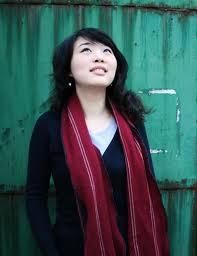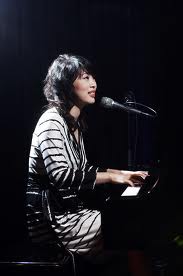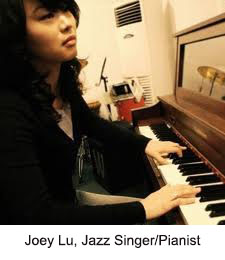This week’s blog is a profile of Ms. Joey Lu from my forthcoming book Jazz in the Land of the Dragon.
Chinese-born, Shanghai-located singer/pianist Joey Lu is among a handful of female jazz musicians in China. For the most part, women in the Chinese jazz world perform the usual role of “singer” in front of the band. Ms. Lu is somewhat unique. She also plays the piano while she sings, and she has ventured out, albeit gingerly, into the world of composing.
Ms. Lu started studying classical piano at the age of seven. She’s now a graduate (with a bachelor’s) of the Shanghai Conservatory of Music. Her passion for music drives her own style as a budding composer. Her influences are a reflection of her personal diversity, including jazz, pop, funk, and contemporary music. She has been featured on the Shanghai jazz scene for several years and has been performed in many Shanghai venues, including the center of the Shanghai jazz scene, the JZ Club.
The jazz scene in Shanghai, as it is in Beijing and any major city in the world consists of three kinds of venues: the jazz clubs, the large mega-venues, and the hotels. I interviewed Ms. Lu at least a 100 stories up in the newly built J.W. Marriott in Shanghai. The view of Shanghai’s geography from that height was breathtaking.
Ms. Lu performed that evening (as she does six nights a week—except Sunday–from 7p.m.-midnight) with a trio with her on piano, a bass player, and a trumpeter. Apparently, according to Ms. Lu, the six nights a week gig provides a decent living in Shanghai. In this “interview” instance, because her English is not as good as her Mandarin, the interview was conducted with the help of Ms. Scarlett Shao as translator.
*********************************************************************************
MARLOW: How did you get into playing jazz in Shanghai?
JOEY LU: It’s just a coincidence. I’ve played piano and learned classical music from the age of seven. I went to the Shanghai Conservatory of Music. When I graduated I had the opportunity of learning some jazz basics and found I liked jazz more than classical music. So every opportunity I get to gig in any kind of bar in Shanghai to perform jazz music, I take the chance.
MARLOW: What do you like about jazz music that appealed to you more than classical music?
 JOEY LU: Classical music is more restricted. It’s very strict. You have to follow certain rules. In jazz there is more improvisation. There’s more freedom. You can put your feelings and emotions into your music which makes it your own, as opposed to classical music which is someone else’s music. It’s very contained. There’s no freedom. With jazz you can do whatever you want with it.
JOEY LU: Classical music is more restricted. It’s very strict. You have to follow certain rules. In jazz there is more improvisation. There’s more freedom. You can put your feelings and emotions into your music which makes it your own, as opposed to classical music which is someone else’s music. It’s very contained. There’s no freedom. With jazz you can do whatever you want with it.
MARLOW: Who were the first jazz musicians you listened to, the composers?
JOEY LU: Herbie Hancock, Bill Evans. I first heard it on the radio. It was a Chinese radio station, a Shanghai music station. I wasn’t sure what it was the first time I heard it, but later on, when I realized what it was, it was totally different from classical music because I was still learning classical music. That opened me up to jazz music. I felt it was so different. I heard I guess the freedom in jazz music. Something that was very different from classical music. I didn’t feel restricted.
MARLOW: Do they play a lot of jazz now or is it just some jazz?
JOEY LU: Every week they have certain programs where they play jazz, so it’s not everyday, it’s just those certain programs that play jazz to introduce peopleto jazz music.
MARLOW: How would you characterize the jazz scene in Shanghai? Is it big, booming, small, growing?
JOEY LU: Shanghai, as opposed to many other regions and cities in China, has the best opportunity to grow the jazz scene because with all the jazz and all the clubs
jazz has been in Shanghai for the past 20 to 30 years, so it’s not brand new.
It’s going to take a while to expand, but every Saturday night most clubs, most
bars, they introduce brand new music to the scene to many of the locals.
MARLOW: How important is jazz education to growing the jazz scene here in Shanghai?
JOEY LU: It is very important. Jazz education in Shanghai and Shanghai Conservatory of Music has already started giving courses–jazz guitar, jazz piano, jazz bass, so it’s very important for the progress of jazz in Shanghai.
 MARLOW: You’re the first woman pianist I’ve met between Beijing and Shanghai. You’re more of a composer. All of the other women are singers, but none of them play an instrument. All of the other musicians are men. Is this unusual? Are you one of the first female jazz pianists and singers in China?
MARLOW: You’re the first woman pianist I’ve met between Beijing and Shanghai. You’re more of a composer. All of the other women are singers, but none of them play an instrument. All of the other musicians are men. Is this unusual? Are you one of the first female jazz pianists and singers in China?
JOEY LU: Yes, I am the first and men do dominate the jazz scene in Shanghai. However, there are many women who are learning jazz and you will be seeing them very soon, but for now it’s me.
MARLOW: How would you describe the audience for jazz? This audience tonight here in the hotel, is it mostly ex-patriots or is it Chinese, or a combination of the two?
JOEY LU: The majority of our foreigners are American because this is a hotel, however, those Chinese who love jazz, they come and go, even pick a song every now and then.
MARLOW: Do you think the Chinese audience for jazz is going to grow in the next five to 10 years or is it going to stay the same kind of audience?
JOEY LU: I find this question to be very good one because I feel that it will grow and since jazz music is not foreign to Shanghai as of right now, many people will start to grow to like it. Every Saturday night many of the bars and clubs play a lot of jazz music. I feel a lot of people will grow to like jazz music and within the next 5-10 years there will be a lot of marketing companies that are advertising, exposing everyone to jazz music very well. A lot of people will have the opportunity to listen to this kind of music and I think it will grow a lot further.
Please write to me at meiienterprises@aol.com if you have any comments on this or any other of my blogs.
Eugene Marlow, Ph.D.
September 3, 2012
© Eugene Marlow 2012


